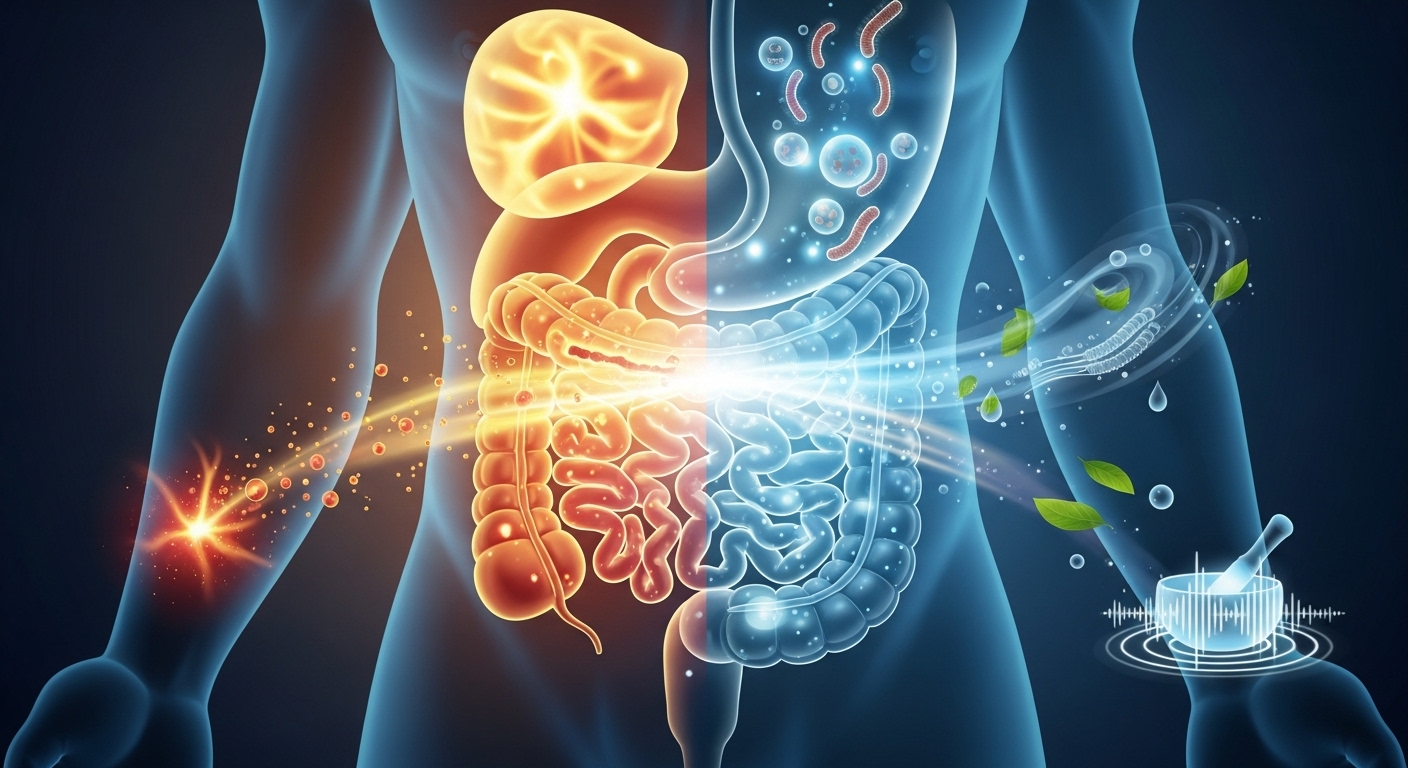
How Alcohol Triggers Leaky Gut and Autoimmune Conditions: A Natural Pathway to Healing
If you're experiencing eczema, arthritis, or other autoimmune symptoms, the answer to your healing might lie in an unexpected place: your gut. Research increasingly shows that alcohol consumption can damage the intestinal barrier, creating a cascade of inflammation that may trigger or worsen autoimmune conditions. Understanding this connection empowers you to make informed choices that support your body's natural healing abilities without relying on lifelong medications.
The Gut Barrier: Your Body's First Line of Defense
Your intestinal lining is only one cell thick, yet it serves as one of your body's most important protective barriers. This sophisticated system allows essential nutrients to pass through while blocking harmful substances like toxins, bacteria, and undigested food particles from entering your bloodstream.
The intestinal barrier includes layers of water, mucous gel, epithelial tissue, and connective tissue, all working together to maintain biological homeostasis. When this barrier functions properly, it keeps your immune system balanced and inflammation in check.
How Alcohol Damages the Intestinal Wall
Alcohol increases bacterial loads and the permeability of the intestinal wall, allowing bacteria to leak through and triggering both local and systemic effects through endotoxin release. This process happens through multiple mechanisms that compound over time.
First, alcohol directly damages the cells that form tight junctions between intestinal cells. These junctions normally act like secure seals, but acetaldehyde, a toxic byproduct of alcohol metabolism produced in the large intestine, contributes to the breakdown of these tight junctions.
Second, alcohol suppresses Paneth cells, one of the intestine's main defenses against bacteria, causing them to secrete fewer antibacterial compounds. This allows harmful bacteria to overgrow and their toxic byproducts to enter the bloodstream.
Even moderate drinking impacts gut integrity. A study of healthy individuals showed increased intestinal permeability after consuming just one standard drink, suggesting that any amount of alcohol can affect the gut barrier.
The Leaky Gut Cascade: From Damaged Barriers to Systemic Inflammation
When the intestinal barrier becomes compromised, larger particles that should remain in your gut slip through into your bloodstream. Your immune system identifies these foreign invaders and launches an inflammatory response to neutralize them.
This condition, known as leaky gut syndrome, allows bacteria and toxins to pass from the gut into the bloodstream, triggering inflammation and immune responses throughout the body. The constant state of alert exhausts your immune system and creates chronic inflammation.
Research supports that alcohol-induced leaky gut and systemic inflammation occur in both low and high doses of alcohol and might affect several medical conditions, including autoimmune diseases.
The Autoimmune Connection: When Your Body Attacks Itself
The link between leaky gut and autoimmune disease represents a paradigm shift in understanding these conditions. In individuals with genetic predisposition, a leaky gut may allow environmental factors to enter the body and trigger the initiation and development of autoimmune disease.
Here's how it unfolds: as foreign particles continuously enter your bloodstream through the compromised gut barrier, your immune system becomes increasingly sensitized. Eventually, it may begin mistaking your own tissues for threats, launching attacks against your joints, skin, or other organs.
Specific Autoimmune Conditions Linked to Leaky Gut
Rheumatoid Arthritis: Enhanced intestinal permeability, combined with upregulation of zonulin and downregulation of tight junction proteins, was evident in mice with collagen-induced arthritis, and importantly, these pathological events were observed before the onset of arthritis. This suggests that gut dysfunction may precede the development of joint symptoms.
Eczema and Skin Conditions: Dermatological disorders such as eczema, psoriasis, and hives are associated with leaky gut syndrome. The skin often reflects internal inflammation, making it a visible indicator of gut health issues.
Multiple Forms of Arthritis: Multiple autoimmune diseases may arise or be exacerbated due to leaky gut, including inflammatory bowel disease, celiac disease, type 1 diabetes, multiple sclerosis, and systemic lupus erythematosus.
The Gut Microbiome: Your Internal Ecosystem Under Siege
Your gut houses trillions of microorganisms that play crucial roles in digestion, immunity, and overall health. Alcohol-induced gut dysbiosis is partly caused by the different vulnerability of gut bacteria against alcohol.
Specifically, excessive alcohol consumption decreases beneficial bacteria such as Bifidobacterium and Lactobacillus, and these changes result in gut damage. The loss of these protective bacteria leaves your gut more vulnerable to harmful organisms and inflammation.
Breaking Free: Natural Approaches to Gut Healing
The encouraging news is that intestinal damage can often be reversed. Studies show that in alcohol-dependent individuals, abstinence increased intestinal concentrations of beneficial bacteria. Your body possesses remarkable healing capabilities when given the right support.
Dietary Strategies for Gut Restoration
Eliminate Inflammatory Triggers: Beyond alcohol, reducing or eliminating gluten, processed foods, and sugar gives your gut the opportunity to heal. These substances can perpetuate inflammation and prevent recovery.
Embrace Gut-Healing Foods: Focus on nutrient-dense whole foods, particularly those rich in fiber, which feed beneficial bacteria. Include fermented foods like sauerkraut, kimchi, and kombucha to replenish healthy gut flora.
Support with Targeted Nutrients: Studies found relationships between zinc deficiency and gut leakiness, with zinc-deficient mice showing increased intestinal permeability and higher plasma endotoxin levels. Similarly, vitamin D may protect gut health from damage.
Consider Probiotics: Lactobacillus strains have been shown to protect intestinal cells from inflammation-associated responses, and feeding rats with Lactobacillus GG reduced plasma levels of endotoxin and severity of liver injury.
The Breathwork Solution: Activating Your Body's Natural Healing Response
While dietary changes form the foundation of gut healing, breathwork offers a powerful complementary tool that's often overlooked. The connection between breath and digestion runs deeper than most people realize.
Understanding the Stress-Gut Connection
When stressed, our nervous system shifts into fight-or-flight mode, triggering disrupted digestion, bloating, and inflammation, and when the body is in constant stress, it releases cortisol, which over time may damage the gut lining and contribute to leaky gut syndrome.
This creates a vicious cycle: stress damages your gut, and gut dysfunction creates more inflammation and stress on your body. Breaking this cycle requires addressing both the physical and nervous system components.
How Breathwork Heals the Gut
When we breathe deeply from the belly, known as diaphragmatic breathing, we shift into the parasympathetic nervous system, turning off the automatic stress response and optimizing digestion and overall gut health by increasing blood flow and oxygen to the digestive tract.
The benefits extend beyond immediate relaxation:
Reduces Inflammation: Through deep, conscious breathing, breathwork improves oxygenation and blood flow to the digestive organs, and increased oxygen supply promotes the growth of beneficial gut bacteria, aids in nutrient absorption, and supports the healing of inflamed gut tissues.
Activates the Vagus Nerve: Abdominal breathing stimulates the vagus nerve, which controls the rest and digest component of the nervous system and plays an important role in digestion by activating the enteric nervous system, which causes the intestinal muscles to churn the food we consume.
Lowers Stress Hormones: Deep breathing lowers levels of stress hormones like cortisol in the body, and high cortisol levels are associated with increased inflammation in the gut, exacerbating conditions such as inflammatory bowel disease.
Balances the Autonomic Nervous System: By practicing breathwork regularly, individuals can promote a balanced state between the sympathetic and parasympathetic branches of the nervous system, thus optimizing digestive function and reducing inflammation in the gut.
SOMA Breath: Your Partner in Gut Healing
SOMA breath techniques combine rhythmic breathing patterns with breathwork holds and intention-setting to create profound physiological changes. This practice goes beyond simple relaxation, actually reshaping how your body responds to stress and creating optimal conditions for gut healing.
By incorporating daily breathwork practice alongside dietary improvements, you create a comprehensive healing protocol that addresses both the physical damage to your gut and the stress patterns that perpetuate inflammation.
Creating Your Personalized Healing Protocol
Healing from leaky gut and autoimmune conditions requires commitment, but the reward is profound: reclaiming your health and vitality without dependence on lifelong medications. Here's how to begin:
Week 1-2: Assessment and Foundation
Eliminate alcohol completely
Remove other inflammatory triggers (gluten, processed foods, excess sugar)
Begin daily breathwork practice, even just 5-10 minutes
Start a food and symptom journal
Week 3-4: Building Momentum
Introduce gut-healing foods and probiotics
Increase breathwork sessions to 15-20 minutes daily
Notice improvements in digestion and energy
Evaluate supplement needs (zinc, vitamin D)
Month 2-3: Integration and Deepening
Establish sustainable eating patterns
Deepen breathwork practice with more advanced techniques
Track reduction in autoimmune symptoms
Consider working with practitioners for additional support
Month 4 and Beyond: Maintenance and Thriving
Continue protective lifestyle practices
Use breathwork as a daily wellness tool
Celebrate improvements in symptoms
Inspire others with your transformation
The Power of Informed Choice
Understanding how alcohol triggers leaky gut and contributes to autoimmune conditions gives you the knowledge to make empowered decisions about your health. You're not powerless against these conditions—you have the ability to influence their course through daily choices.
The conventional medical approach often focuses on managing symptoms with medications that may need to be taken indefinitely. While these treatments have their place, many people find greater satisfaction and success by addressing root causes through lifestyle medicine.
By eliminating alcohol, healing your gut with targeted nutrition, and supporting your nervous system through breathwork practices like SOMA breath, you create the conditions for your body to heal itself. This isn't about perfection—it's about progress and choosing health-supporting practices that align with how your body is designed to function.
Your journey to healing begins with a single conscious choice. Whether you're experiencing the first signs of autoimmune dysfunction or have been struggling with symptoms for years, your body retains the capacity to heal when given the right support. The path forward combines ancient wisdom with modern science, offering you a natural, sustainable approach to wellness that honors your body's innate intelligence.
Take the first step today. Your gut—and your entire body—will thank you.
This article is for educational purposes only and is not intended as medical advice. Always consult with qualified healthcare practitioners before making significant changes to your health regimen, especially if you have existing medical conditions or take medications.


